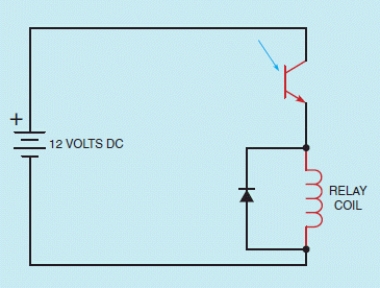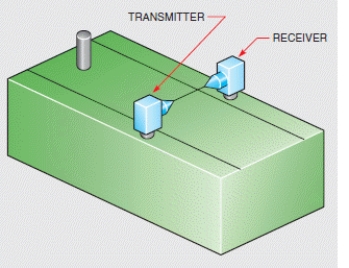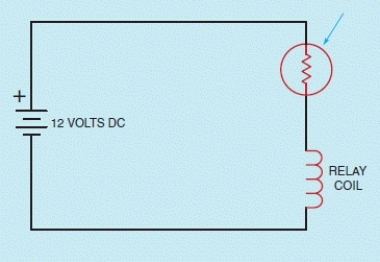Deck 20: Photodetectors
Question
Question
Question
Question
Question
Question
Question
Question
Question
Question
Question
Question
Question
Question
Question

Unlock Deck
Sign up to unlock the cards in this deck!
Unlock Deck
Unlock Deck
1/15
Play
Full screen (f)
Deck 20: Photodetectors
1
Figure 20-05

The circuit in the accompanying figure shows a phototransistor used to turn on a relay coil. What is the difference when the phototransistor is in the presence of darkness versus light?

The circuit in the accompanying figure shows a phototransistor used to turn on a relay coil. What is the difference when the phototransistor is in the presence of darkness versus light?
When the phototransistor is in darkness, no electrons are emitted by the base junction, and the transistor is turned off. When the phototransistor is in the presence of light, it turns on and permits current to flow through the relay coil.
2
Regardless of the type of photoemissive device used, or the type circuit it is used in, the greatest advantage of the photoemissive device is ____________________.
speed
3
____________________ emit electrons when in the presence of light.
Photoemissive devices
4
Photovoltaic devices are more often called ____________________.

Unlock Deck
Unlock for access to all 15 flashcards in this deck.
Unlock Deck
k this deck
5
The most common photoconductive device is the ____________________.

Unlock Deck
Unlock for access to all 15 flashcards in this deck.
Unlock Deck
k this deck
6
Photovoltaic cells cannot operate electrical equipment without external power.

Unlock Deck
Unlock for access to all 15 flashcards in this deck.
Unlock Deck
k this deck
7
Figure 20-13

What does the accompanying figure show?

What does the accompanying figure show?

Unlock Deck
Unlock for access to all 15 flashcards in this deck.
Unlock Deck
k this deck
8
Photoconductive devices exhibit a change of resistance due to the presence or absence of light.

Unlock Deck
Unlock for access to all 15 flashcards in this deck.
Unlock Deck
k this deck
9
Photodetectors that have both the transmitter and the receiver units mounted in the same housing depend on a reflector for operation.

Unlock Deck
Unlock for access to all 15 flashcards in this deck.
Unlock Deck
k this deck
10
The amount of voltage produced by a cell is determined by the material of which it is made.

Unlock Deck
Unlock for access to all 15 flashcards in this deck.
Unlock Deck
k this deck
11
Photo-operated devices fall into one of three categories. What are the categories?

Unlock Deck
Unlock for access to all 15 flashcards in this deck.
Unlock Deck
k this deck
12
Figure 20-01

The accompanying figure shows the schematic symbol for a photovoltaic cell. What do the battery and arrow symbols mean?

The accompanying figure shows the schematic symbol for a photovoltaic cell. What do the battery and arrow symbols mean?

Unlock Deck
Unlock for access to all 15 flashcards in this deck.
Unlock Deck
k this deck
13
Photodetectors have to make physical contact with the object they are sensing.

Unlock Deck
Unlock for access to all 15 flashcards in this deck.
Unlock Deck
k this deck
14
A(n) ____________________ steals the base current away from some other transistor to keep it turned off.

Unlock Deck
Unlock for access to all 15 flashcards in this deck.
Unlock Deck
k this deck
15
Figure 20-10

In the circuit shown in the accompanying figure, although the circuit will work if the cad cell is large enough to handle the current, there are still two problems. What are they?

In the circuit shown in the accompanying figure, although the circuit will work if the cad cell is large enough to handle the current, there are still two problems. What are they?

Unlock Deck
Unlock for access to all 15 flashcards in this deck.
Unlock Deck
k this deck



